|
|
|
Sort Order |
|
|
|
Items / Page
|
|
|
|
|
|
|
| Srl | Item |
| 1 |
ID:
109711


|
|
|
|
|
| Publication |
2011.
|
| Summary/Abstract |
This article presents the main regulatory changes that occurred in the Brazilian power sector in 2009, along with the impacts these changes caused on the market, especially related to small hydropower (<30 MW). This study addresses regulatory issues based on inventory studies and records of basic projects, changes related to the compensation of the assured energy of SHPs in the Brazilian energy reallocation market, the socio-economic impact resulting from the construction of SHPs, SHPs in alternative resource auctions and finally the general outlook for the growth scenario for SHPs in Brazil according to the ten-year plan (2010-2019). The overall conclusions of this investigation were that the 2008/2009 biennium was a period of great changes in the regulation of small hydropower plants in Brazil, and the SHP market has shown maturity. Additionally, despite SHP being a type of technology that is completely dominated by domestic industry, in recent years, they have experienced policy disincentives caused by changes to rules that inhibit their growth.
|
|
|
|
|
|
|
|
|
|
|
|
|
|
|
|
| 2 |
ID:
109739


|
|
|
| 3 |
ID:
077079
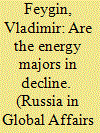

|
|
|
|
|
| Publication |
2007.
|
| Summary/Abstract |
The Shtokman project may be a forerunner of critical changes in the global energy sector. The older-generation majors are heading for very tough competition. The governments of the resource-rich countries, and national companies enjoying governmental support are interested in reducing the role of transnational corporations to that of ordinary contractors.
|
|
|
|
|
|
|
|
|
|
|
|
|
|
|
|
| 4 |
ID:
141994
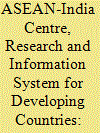

|
|
|
|
|
| Publication |
New Delhi, Routlege, 2015.
|
| Description |
xliii, 143p.: ill., figures, tables, mapspbk
|
| Standard Number |
9781138653481
|
|
|
|
|
|
|
|
|
|
|
|
Copies: C:1/I:0,R:0,Q:0
Circulation
| Accession# | Call# | Current Location | Status | Policy | Location |
| 058375 | 341.2473054/ASE 058375 | Main | On Shelf | General | |
|
|
|
|
| 5 |
ID:
127160
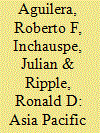

|
|
|
|
|
| Publication |
2014.
|
| Summary/Abstract |
Among natural gas producing nations, there has been some concern about how the Asia Pacific will meet future demand for energy. We argue that natural gas, both regional and global, will play a vital role. Estimates of potential gas consumption in the region are analyzed and used to develop consensus projections to 2030. These consumption profiles are compared with gas supply estimates including indigenous, pipeline and LNG for the Asia Pacific market. From this analytical framework, we find that demand will be sufficiently large to accommodate supplies from diverse sources including North America, the Middle East, Central Asia, Russia, and the Asia Pacific itself. An important policy implication is that gas producing and consuming nations should benefit from promoting gas trade and not be concerned about a situation of potential lack of demand coupled with oversupply.
|
|
|
|
|
|
|
|
|
|
|
|
|
|
|
|
| 6 |
ID:
124610
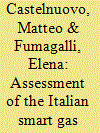

|
|
|
|
|
| Summary/Abstract |
The introduction of smart metering is one of the core elements in recent European policies targeting environmental sustainability and competitiveness of energy markets. Following the roll-out of smart electricity meters, in 2008 the Italian regulator designed an ambitious deployment program also for smart gas meters, that was recently modified in both scope and timing.
This paper assesses Italy's original and current deployment plans, with a specific focus on the results of its cost-benefit analysis. In light of the evidence derived from the literature, we observe that the case for the roll-out of smart gas meters in Italy was not supported by a strong emphasis on energy savings but rather focused on increasing efficiency of the Italian gas market; in this respect, we argue that options other than smart gas metering should also be considered. Moreover the Italian cost-benefit analysis, which mostly dealt with the potential cost savings for distributors and suppliers, led to ambiguous results in terms of net present values; thus, we believe that an updated assessment would be extremely useful. Finally, in terms of technological choices, our analysis positively evaluates the regulator's recent proposal to consider a dual-fuel solution for the mass market deployment.
|
|
|
|
|
|
|
|
|
|
|
|
|
|
|
|
| 7 |
ID:
139278


|
|
|
|
|
| Summary/Abstract |
Considering the development of the Bulgarian energy security strategy this article analyses how the country has adapted to EU membership and to energy security challenges, such as disruptions to Russian gas supplies in 2006 and 2009 and rising gas prices. Utilising a conceptual lens which synthesises Regional Security Complex Theory and Europeanisation, the article offers an explanation of energy policy changes. It concludes that conceptions of Russia as an energy security guarantor have changed since Bulgaria's EU accession and that Bulgarian energy policy has undergone a qualified reorientation away from a positive dependence on Russian energy sources, towards a convergence with EU priorities of diversification and a single energy market.
|
|
|
|
|
|
|
|
|
|
|
|
|
|
|
|
| 8 |
ID:
133215
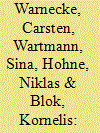

|
|
|
|
|
| Publication |
2014.
|
| Summary/Abstract |
The current project-based carbon market mechanisms such as the Clean Development Mechanism (CDM) and the Joint Implementation (JI) do not have a direct impact on global greenhouse gas emission levels, because they only replace or offset emissions. Nor do they contribute to host country×s national greenhouse gas emission reduction targets. Contributions to net emission reductions in host countries is likely to become mandatory in new mechanisms under development such as in the framework for various approaches, a new market-based mechanism and even in a reformed JI. This research analysed the question if approaches for carbon market-based mechanisms exist that allow the generation of net emission reductions in host countries while keeping project initiation attractive. We present a criteria-based assessment method and apply it for four generic options in existing mechanisms and derive implications for future mechanism frameworks. We identified the application of "discounts" on the amount of avoided emissions for the issuance of carbon credits and "standardisation below business as usual" as most promising options over "limiting the crediting period" and "over-conservativeness". We propose to apply these options differentiated over project types based on internal rate of return to ensure cost-efficiency and attractiveness.
|
|
|
|
|
|
|
|
|
|
|
|
|
|
|
|
| 9 |
ID:
127911


|
|
|
|
|
| Publication |
2014.
|
| Summary/Abstract |
Wind energy has been negotiated in Brazil's regulated market through auctions organized by the government. Bilateral negotiations in the free market have been scarce. In 2011 wind farms were allowed to bid in 'A minus 5 (A?5)' auctions, for energy with first delivery date 5 years ahead. This new design was expected to stimulate negotiations in the free market, as the 20-year contract in the regulated market eases financing while the 5-year grace period grants wind farms the option to sell whatever energy is generated beforehand in the free market. We modeled bidders' price decision in A?5 auctions as Real Options and concluded that given the low prices averaging USD 50/MW h, winners are tempted to defer investment, expecting more favorable equipment and energy prices, or a better knowledge of the wind site. Construction is likely to begin in 2-3 years, with little time left for the free market. Bidders that consider the option of eventually abandoning the project are more price competitive, increasing chances that some wind farms will never materialize. Therefore, this attempt to foster the free market may not pay-off and, moreover, it may have the unfavorable effect of turning Brazil's energy expansion planning a more difficult task.
|
|
|
|
|
|
|
|
|
|
|
|
|
|
|
|
| 10 |
ID:
074838
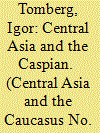

|
|
|
| 11 |
ID:
114849
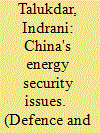

|
|
|
| 12 |
ID:
116209
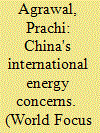

|
|
|
| 13 |
ID:
132779


|
|
|
|
|
| Publication |
2014.
|
| Summary/Abstract |
Simultaneous rapid rise in both the world oil and agricultural commodity prices have increased interest in determining price transmission from oil prices to those of agricultural commodities. However, although a lot of the empirical research has studied the relation between oil price changes and economic activity, it is surprising that little research has been conducted on the relationship between oil price shocks and the large-size emerging industrial countries agricultural market. Therefore, the main goal of this study is that we are try to use the more detail and new China's weekly data which from 2004/9 to 2012/9 to fill this gap. This study examines the short and long-run interdependence between China fuel oil prices and the average of different kinds of key agricultural commodity prices in China. To this end, the Toda-Yamamoto causality approach and impulse response analysis method are applied to identification of the long and short-run interrelationships. In contrast to lots of the traditional causality analysis indicates that the oil prices and the agricultural commodity prices do not influence each other, our result is mix: we have inferred that the fluctuation of fuel oil price has a short-run effect on the dynamics of agricultural products in China; however, there are no significant in the long-run effects.
|
|
|
|
|
|
|
|
|
|
|
|
|
|
|
|
| 14 |
ID:
083585


|
|
|
|
|
| Publication |
2008.
|
| Summary/Abstract |
With the price of oil crossing $110 a barrel, the oil-importing countries' concerns have been mounting. Not surprisingly, the issue of whether the time is now ripe for energy consuming countries to take measures to counter the producers' growing clout is being discussed, including the formation of a consumers' cartel, to force exporters to bring down prices. This paper looks at attempts by consumers to counter the growing clout of the producers, whether such attempts will succeed or whether they will exacerbate the divisive trends that have recently surfaced in the international energy market.
|
|
|
|
|
|
|
|
|
|
|
|
|
|
|
|
| 15 |
ID:
124693
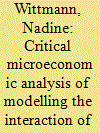

|
|
|
|
|
| Publication |
2013.
|
| Summary/Abstract |
This paper presents an alternative approach to a graphical analysis of the interaction of White Certificates with the EU emission trading scheme as the approach of Sorrell et al. (2009a contains the following aspects that require some clarification: first, the issue of a clearer distinction between conventional and alternative energy supply is brought up. Second, the concept of a minimum requirement for energy demanded is discussed. Third, the correlation between demand for energy and demand for energy efficiency measures is displayed in a more intuitive manner. The effects of introducing WCTS and EU ETS into the market setting are then analyzed accordingly.
|
|
|
|
|
|
|
|
|
|
|
|
|
|
|
|
| 16 |
ID:
132630


|
|
|
|
|
| Publication |
2014.
|
| Summary/Abstract |
The recent low CO2 prices in the European Union Emission Trading Scheme (EU ETS) have triggered a discussion whether the EU ETS needs to be adjusted. We study the effects of CO2 price floors and a price ceiling on the dynamic investment pathway of two interlinked electricity markets (loosely based on Great Britain, which already has introduced a price floor, and on Central Western Europe). Using an agent-based electricity market simulation with endogenous investment and a CO2 market (including banking), we analyse the cross-border effects of national policies as well as system-wide policy options.
A common, moderate CO2 auction reserve price results in a more continuous decarbonisation pathway. This reduces CO2 price volatility and the occurrence of carbon shortage price periods, as well as the average cost to consumers. A price ceiling can shield consumers from extreme price shocks. These price restrictions do not cause a large risk of an overall emissions overshoot in the long run. A national price floor lowers the cost to consumers in the other zone; the larger the zone with the price floor, the stronger the effect. Price floors that are too high lead to inefficiencies in investment choices and to higher consumer costs.
|
|
|
|
|
|
|
|
|
|
|
|
|
|
|
|
| 17 |
ID:
114623
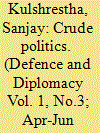

|
|
|
|
|
| Publication |
2012.
|
| Summary/Abstract |
Energy is the basic necessity for all living beings to survive on planet
earth, and no one knows this better than human beings. We also
know that energy reserves in the world are not infinite. The data on
the quantum of energy reserves in different parts of the world, based
on scientific research, and other reliable methods is, in one way, one
of the factors, which can influence the concern of any nation on the
availability of this resource, which is so crucial for the sound economic
growth, and development of human beings. Those who possess
this wealth in abundance as of now may not be concerned about its
availability, but those who do not have in abundance, or who have
very limited energy resources, or have sufficient resources but not
enough to fuel the fast pace of growth and economic development and
are hungry for more, are now more concerned about the affordability
and security of energy reserves both within their own country as well
as in nations which are the producers of this vital resource.
|
|
|
|
|
|
|
|
|
|
|
|
|
|
|
|
| 18 |
ID:
133213


|
|
|
|
|
| Publication |
2014.
|
| Summary/Abstract |
This paper estimates the relationships between bidding quantities, marginal cost and market power measures in the Spanish wholesale electricity market for two different regulatory periods: 2002-2005 and 2006-2007. Using panel econometric techniques we find differences in the impacts on bidding strategies for both periods. Hence, the marginal cost and the market power measures affect bid and net quantities. The market power measures also suggest that the coefficient is consistently positive and highly significant for both periods.
Moreover, the market power and marginal costs have mixed effects according to the models proposed for both periods. In addition, our results point to the effectiveness of the different effects of mitigating the market power in the Spanish electricity market. For the 2006-2007 period, the proposed causal relationships are partially validated by the cointegration results, which assumes there is a significant causality between the Lerner Index and the marginal cost.
|
|
|
|
|
|
|
|
|
|
|
|
|
|
|
|
| 19 |
ID:
087867
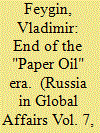

|
|
|
|
|
| Publication |
2009.
|
| Summary/Abstract |
The world community has entered a period that will determine the future development of the economy and, possibly, the entire arrangement of the global system. Manifestations of the crisis are wide-reaching and multifaceted, while the unstable situation makes forecasting barely possible. Dynamical systems theory experts link such phenomena to the "points of bifurcation," at which the smooth trajectory of development ends and the system's behaviour undergoes a restructuring, the results of which are hard to predict.
Some weighty disproportions, underestimated interconnections and risks that were not embraced by an in-depth analysis or were simply hushed up have come to the surface. The crisis makes it easier to rethink the situation, as the dominant paradigm, which could scarcely be called into question in conditions of economic growth, is getting weaker.
The structure of economic ties that took shape in the past decades has serious inherent inconsistencies. The widespread conviction that the expanding global economy is stable by virtue of its scale and diversification of the participants' interests is creaking at the seams. The towering imbalances of world trade and U.S. deficits aggravate the general situation, but market participants cannot assess the situation adequately or counteract to it using the available instruments (hence the abrupt fluctuations of exchange rates). As a result, market participants often act relying on feelings (sometimes strange even for professional market analysts) that easily grow into panic.
|
|
|
|
|
|
|
|
|
|
|
|
|
|
|
|
| 20 |
ID:
092859
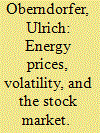

|
|
|
|
|
| Publication |
2009.
|
| Summary/Abstract |
This paper constitutes a first analysis on stock returns of energy corporations from the Eurozone. It focuses on the relationship between energy market developments and the pricing of European energy stocks. According to our results, oil price hikes negatively impact on stock returns of European utilities. However, they lead to an appreciation of oil and gas stocks. Interestingly, forecastable oil market volatility negatively affects European oil and gas stocks, implying profit opportunities for strategic investors. In contrast, the gas market does not play a role for the pricing of Eurozone energy stocks. Coal price developments affect the stock returns of European utilities. However, this effect is small compared to oil price impacts, although oil is barely used for electricity generation in Europe. This suggests that for the European stock market, the oil price is the main indicator for energy price developments as a whole.
|
|
|
|
|
|
|
|
|
|
|
|
|
|
|
|
|
|
|
|
|